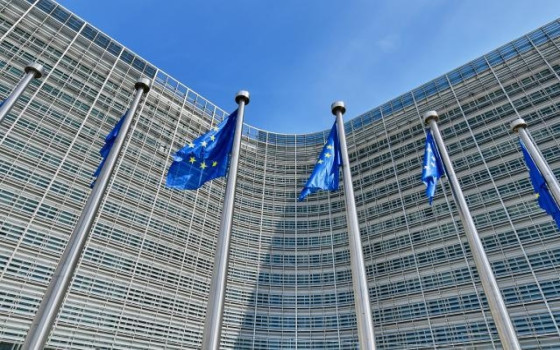
The European Commission, following the conclusion of the meeting of Finance and Economy Ministers: The most prominent challenges are digital and green transformation, high energy prices, and geopolitical tensions.

- Europe and Arabs
- Sunday , 25 February 2024 14:1 PM GMT
Brussels: Europe and the Arabs
The Vice-President of the European Commission, Valdis Dombrovskis, stressed that the most prominent challenges facing the unified European bloc are the digital and green transformation, high energy prices, and geopolitical tensions. The European official was speaking at the conclusion of the discussions of the finance and economic ministers of the European Union countries, which he hosted over two days, Friday and Saturday, in the city. Ghent, Belgium, where the current rotating presidency of the Union is
A European statement distributed last night in Brussels quoted the Vice-President of the Commission, who said that during the informal economic meeting: One of the topics that was frequently repeated in our discussions in Ghent revolved around how the European Union can maintain its competitiveness in the world.
Competitiveness is key. It is the engine of the European social market economy.
However, there are some long-known weaknesses that threaten to make the EU less competitive internationally. We should view these issues against the backdrop of new challenges presented by the green and digital transition, rising energy prices, and rising geopolitical tensions.
One example is low growth in labor productivity.
Another reason is our relatively low level of spending on research and development – which has led to our innovation performance lagging behind that of the United States, Japan, and China.
In short, the European Union is under pressure. We must raise our game to keep up with others racing ahead.
I see four main areas we should focus on.
Starting with our core strength, the single market: we are taking action to strengthen it, remove barriers and unleash its full potential for innovation and growth.
Then, maximizing the benefits of the EU's trade openness, while minimizing our strategic vulnerabilities. This is a key element of our economic security strategy.
We are also taking steps to ensure that the EU business environment remains attractive. This is essential. We need skilled labor, a stable regulatory environment and less bureaucracy for businesses.
Finally, and of particular importance, there is the need to attract and generate more investment, especially from the private sector, to meet our ambitions and policy objectives.
The obvious key to opening the door to more private investment is, of course, capital markets union.
The CMU project is key to diversifying sources of financing for EU companies, allocating capital efficiently across the EU and channeling capital towards long-term investments.
Deeper and more integrated capital markets would provide a financial environment that supports sustainable economic growth and job creation.
As such, the Communications Management Unit is vital to the work we do to promote investment and keep our economy competitive.
Yesterday, Saturday, we discussed the strategic priorities of the European Investment Bank.
The EIB Group continues to play a key role in promoting EU policies and priorities on the ground. It directs and stimulates public and private financing accordingly.
Given today's geopolitical tensions, combined with new and emerging risks, the EIB's engagement – in line with changing needs – is more important than ever.
Before I conclude, I would like to thank Vincent and the Belgian Presidency for organizing this informal meeting in the beautiful city of Ghent. Thank you for inviting us.












No Comments Found